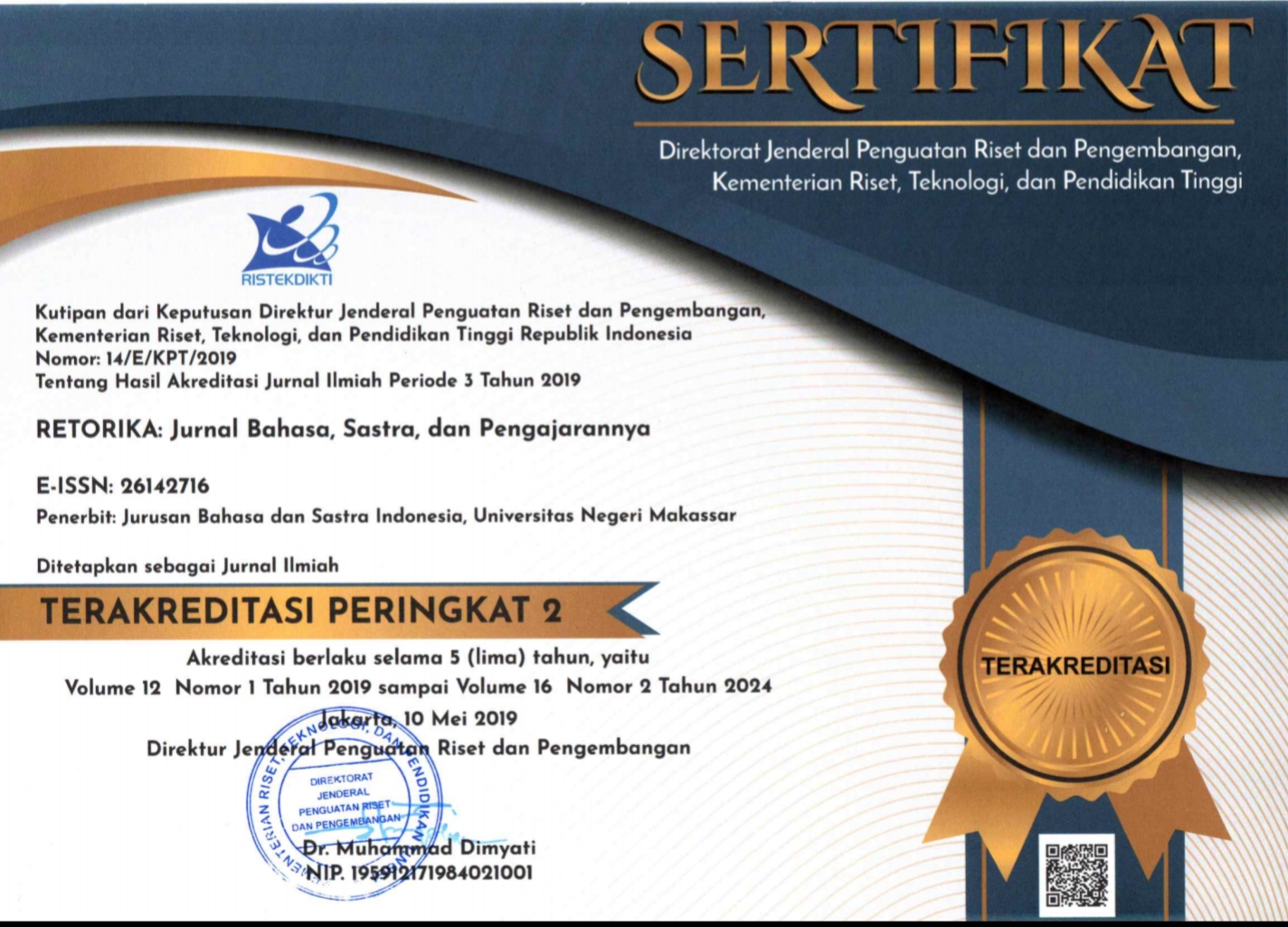EUFEMISME DAN DISFEMISME DALAM NOVEL “KORUPSI” KARYA PRAMOEDYA ANANTA TOER
(1) Padang State University
(2) Padang State University
(3) Padang State University
(*) Corresponding Author
DOI: https://doi.org/10.26858/retorika.v12i2.9149
Abstract
Eufimism and Disphemism in "Corruption" Novel by Pramoedya Ananta Toer.The purpose of this study is to explain the form and function of the use of euphemism and disfemism in the novel "Corruption" by Pramoedya Ananta Toer. This type of research includes descriptive research. The data collection technique used is the note-reading technique. Data analysis used agih and equivalent methods. The validity of the data is obtained through intrarater and interrater. The results of this study are classifications of euphemism and disfemism. The classification is classified into words, phrases and sentences. In addition, the background to the use of euphemism and disfemism is the form in the novel "Corruption" in this study.
Keywords
Full Text:
PDFReferences
Almoayidi, K.A. 2018. Euphemism as a Com-municate Tool: A Descriptive Study of Hijazi and Southren Region Dialects Spoken in Saudi Arabia. Open Journal of Modern Linguistics, 8: 1-8. doi:10.4236/ojml.2018. 81001
Hojati, A. 2012. A Study of Euphemisms in the Con-text of English-speaking Media. International Journal of Linguistics, 4(4):552–562. doi:10. 5296/ijl.v4i4.2933
Juwita & Agus. 2018. Penginovasian Bentuk Disfe-misme pada Berita Online dan Relevansinya pada Bahan Ajar Bahasa Indonesia di SMP. Jurnal Pendikan Bahasa dan Sastra, 7(2): 33-45.
Khasan, dkk. 2014. Pemakaian Disfemisme dalam Berita Utama Surat Kabar Joglo Semar. Basastra. 2(3): 1-12.
Kurniawati, H. 2011. Eufemisme dan Disfemisme dalam Spiegel Online. Litera. 10(1): 51-63.
Laili, E. N. 2016. Eufemisme dalam Wacana Ling-kungan Sebagai Piranti Manifestasi Mani-pulasi Realitas: Perspektif Ekolinguistik Kri-tis. Jurnal Linguistik Terapan, 6(1): 26-36.
Meilasari, P. dkk. 2016. Analisis Terjemahan Ung-kapan Eufemisme dan Disfemisme pada Teks Berita Online BBC. Journal of Linguistics. 1(2): 336-358.
Norashikin, dkk. 2017. Unsur Eufemisme dalam No-vel Jalan Retak Karya A. Samad Said. Journal of Business and Social Development, 5(1): 88-101.
Ojebuyi & Abiodun. 2018. Nigerian Newspapers’ Use of Euphemism in Selection and Presen-tation of News Photographs of Terror Acts. Sage Open. 1-14. doi: 10.1177/2158244018-763954
Pascarina, H. 2018. Disfemisme dan Terjemahannya pada Teks Berita BBC Online, Leksema. 3(1): 1-10.
Sunarni, N. & Jonjon J. 2017. Eufemisme dalam Bahasa Jepang. Prosodi. 11(2): 119-126.
Sutana, D. 2012. Eufemisme Sebagai Tindak Komu-nikasi yang Berada dalam Bahasa Jawa. Madah, 3(1): 81-90.
Article Metrics
Abstract view : 1343 times | PDF view : 226 timesRefbacks
- There are currently no refbacks.
Copyright (c) 2019 Vioni Saputri

This work is licensed under a Creative Commons Attribution-NonCommercial 4.0 International License.
Published by:
Department of Indonesian Language, Faculty of Languages and Literature, Universitas Negeri Makassar in cooperate with Asosiasi Dosen Bahasa dan Sastra Indonesia (ADOBSI) and Ikatan Program Studi Pendidikan Bahasa dan Sastra Indonesia (IKAPROBSI).
Address: Department of Indonesian Language Office, DG Building Second Floor, UNM Parangtambung, Daeng Tata Raya Street, Makassar, South Sulawesi, Indonesia
 Email: retorika@unm.ac.id
Email: retorika@unm.ac.id

RETORIKA: Jurnal Bahasa, Sastra,dan Pengajarannya is licensed under a Creative Commons Attribution-NonCommercial 4.0 International License.
















